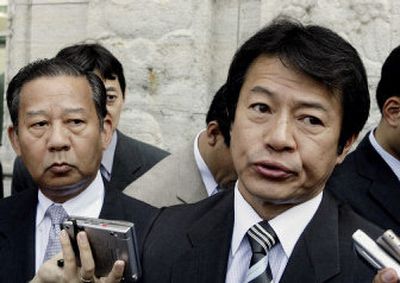WTO trade pact all but doomed

GENEVA – In the end, there was finger pointing and plenty of blame to spread around for the collapse of world trade liberalization talks Monday.
But what it boiled down to is that a deal touted as a way to lift millions of people around the world out of poverty floundered because six of the World Trade Organization’s most powerful members failed to find ways to liberalize trade in farm and manufactured goods.
“We are in dire straits,” said Pascal Lamy, director-general of the WTO, after members called a halt to more than five years of commerce liberalization talks.
There was no new timetable for completing the round. Lamy said he did not intend to propose any new deadlines or a date for negotiators to resume meeting.
The 25-nation European Union criticized U.S. intransigence over agricultural subsidies for the breakdown, while the United States blamed Brazil and India for being inflexible on cutting barriers to industrial imports and the EU for refusing to make deeper cuts in its farm import tariffs.
Last week, presidents and prime ministers from the Group of Eight leading industrialized countries called a new trade deal a top priority. But that promise did not translate into real negotiating action during two days of meetings facilitated by Lamy among Australia, Brazil, the EU, India, Japan and the United States.
Now the whole process of agreeing to a binding treaty may have to be shelved until after U.S. presidential elections in 2008 because President Bush’s “fast-track” authority to strike trade deals expires next year.
Without that measure, which requires an up or down vote without amendments, it would be much harder to gain congressional approval in the U.S., the world’s largest trading nation.
Analysts have warned that a failure of the Doha round will lead to more bilateral trade pacts between nations, which are not expected to bring as many economic benefits as the multilateral deal.
Some ministers also warned Monday that the suspension of the Doha talks, which were launched in Qatar’s capital in 2001, might also cause an increase in the number of trade disputes being brought to the WTO.
“This is a serious setback, a major setback,” said Brazilian Foreign Minister Celso Amorim.
“It is somewhere between intensive care and the crematorium,” India’s Trade and Industry Minister Kamal Nath said of the Doha round, which aims to boost the global economy by lowering trade barriers across all sectors, with particular emphasis on helping poorer countries develop their economies through export growth.
Nath said “it could take anywhere from months to years” to restart the negotiations, which stalled as poorer countries demanded that the EU and United States offer greater cuts in support for their farmers.